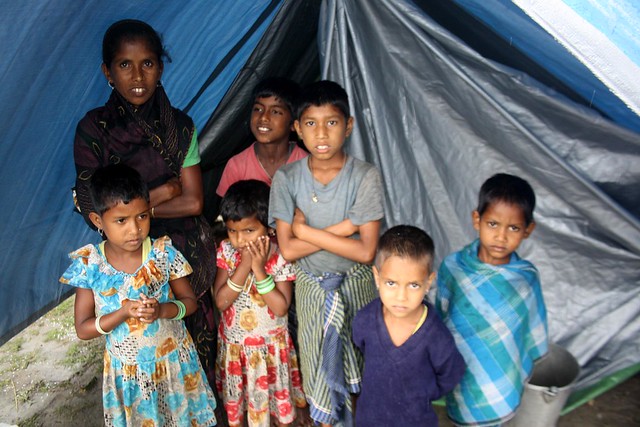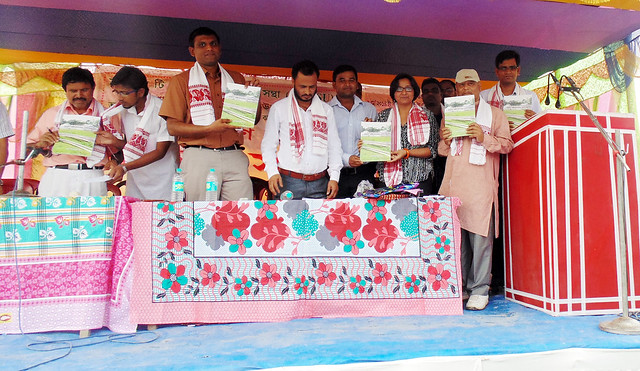By Abdul Gani, TwoCircles.net,
Guwahati: Life cannot be more cruel than this for Kashem Ali, the man who lost his daughter to the armed militants just when he was about to forget the pain of losing his mother and elder sister.In 1994 when Ali lost his mother and elder sister to militancy. On May 2, 2014 he could do nothing but to be a witness to the death of his five year old daughter’s death when armed militants opened fired indiscriminately in Assam’s Baksa district.
Saturday was the first anniversary of that tragic incident which will probably haunt him for the rest of his life. Ali has been living at the make-shift camp at Narayanguri for last one year along with 60 odd inmates.

File photo of inmates at the Narayanguri makeshift camps in Baksa district
“I have nothing left in life. As a child I was a witness to see my mother being killed by militants and again I lost my daughter in front of my eyes. I also lost my elder sister in 1994. When will I get justice?” Ali, who also bears a bullet mark in his neck after he escaped narrowly in 1994 attack, told TCN.
Like Ali there are many who are waiting for justice, with the hope against all odds. On Saturday, they came together to renew their demand for justice.
Last year, armed militants opened fire indiscriminately in the villages killing 42 including children and women on May 2.
Abdul Kalam Azad, a post-graduate student of Tata Institute of Social Science (TISS) and activist who carried out a report ‘One Year of Khagrabari Massacre: Quest for Justice Continues’ on the incident and the victims said that it’s unfortunate that time again these people are denied justice.

“This report is an endeavour to bring out the live stories of struggle by the victims of Khagrabari massacre and the engagement of workers and volunteers of Jhai Foundation. It also tries to draw the contemporary socio-political portrait of BTAD area in this report,” he told TCN.
In the year 2014, the outlawed Sonbijit faction of National Democratic Front of Bodoland (NDBF) had carried several massacres in Bodoland Territorial Area Districts (BTAD) and adjoining districts including at Khagrabari in May later on Adivasi people in December.
“The history of these killings of marginalized people shows that none of the killers have ever been brought to justice. In fact almost all the political parties tried to draw the maximum political benefit out of these massacres. Even the civil societies of Assam have miserably failed to arouse the collective conscience of the society,” said Hafiz Ahmed, president of Char Chapori Sahitya Parishad (CCSP), a literary body of the state.
The report was formally released on Saturday in an event organized at the camps’ site. TISS professor and activist Shalini Sharma who formally released the report stressed on the need of providing justice to these people.

“How has Assam mastered the art of living with violence? More importantly, why? When official memory of Narayanguri, Khagrabari massacre entails erasure of memories and denial of lived reality of survivors of violence, the onus to keep history alive rests with community,” said Sharma, who has also been pro-active with the Bhopal gas tragedy campaign.
She added, “These reports are living testimonies of our collective shame. These are also poignant reminders of what we stand to lose if we don’t acknowledge the collective suffering- humanity! This anniversary should trigger a resolve for vigilant remembrance, because cost of forgetting would be huge.”
The related cases were handed over to the National Investigation Agency (NIA) and are still pending investigations.
“Assam chief minister Tarun Gogoi had announced that investigation will be handed over to NIA, but it took 81 days to actually hand over the investigation. Finally after lots of protests by local activists, the investigation was handed over to investigation was handed over to the NIA July 22 in 2014. However, by then, a substantial amount of evidence was tampered with. The NIA was left with nothing much more than the eye witnesses’ accounts in the case,” said Aman Wadud, an advocate based in Guwahati who is providing legal support to the survivors.
Wadud said that on October 31, 2014, the NIA charge sheeted four forest guards for killing 38 innocent citizens of India. “The trial has begun and witnesses are regularly deposing before Special NIA court at Guwahati. A couple of witnesses who deposed before the court in the last hearing came to Guwahati only for the second time in their life, the first time being when they recorded statement under section 164 CrPc at Chief Judicial Magistrate’s court, Kamrup at Guwahati. All they want is justice and punishment for the perpetrators who killed their loved ones. They might be illiterate and poor but their faith in judiciary is unwavering,” he told TCN.

The function where the report was released at Narayanguri in Baksa district.
Ashraful Hussain, a youth activist, whose friend Dhananjay Nath was also injured in an attack during the same period of time, said that the people are still living in fear.
“I had a talk with Dhananjay and what he told me is really terrifying. The shadow of fear is still looming large. He still scares to go out in darkness,” Hussain said. Dhananjay is a Kokrajhar based journalist who was attacked by armed militants.
Now, the only hope is justice for these people and a desired atmosphere where everybody can live peacefully.
Click here to read the full Report ‘One Year of Khagrabari Massacre: Quest for Justice Continues’

